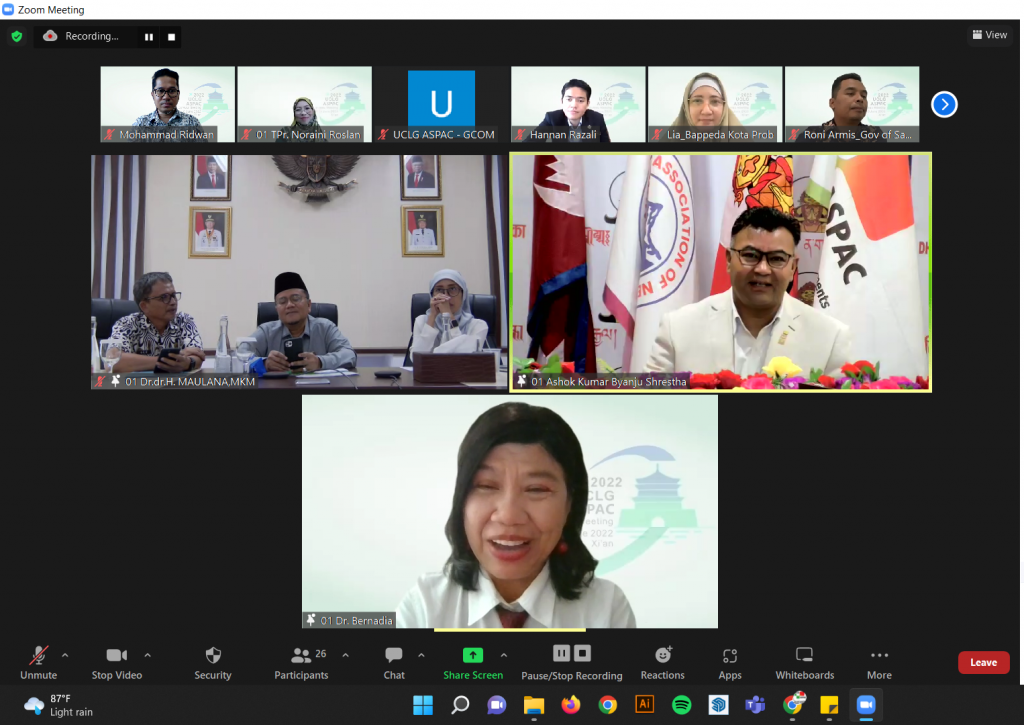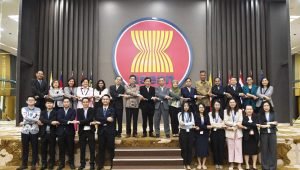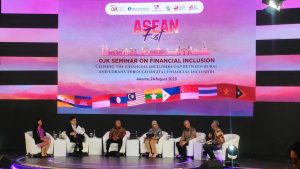Southeast Asia Standing Committee Meeting: Co-organised by the Local Government Unit of Iriga City (Philippines), and UCLG ASPAC
Thursday, 9 June 2022
As the annual agenda of UCLG ASPAC, the UCLG ASPAC Executive Bureau (ExBu) Meeting 2022 was successfully organised online on June 9, 2022. The agenda was attended by 27 people from the Southeast Asia region.
Starting the meeting, the Climate and Energy in ASEAN videos were displayed. After that, Mr. Ashok Kumar Byanju Shrestha (the President of UCLG ASPAC) officially opened the Meeting by delivering welcoming remarks highlighting several points such as the importance of networking, the covid-19 pandemic, the significance of balancing city for the future, and the greatness of long life friendship and partnership.
Besides, President Ashok expressed his gratitude to UCLG ASPAC, the secretariat, partners, and all members for their support. Closing his remarks, President Ashok wished for longer dream and long life for UCLG-ASPAC and the Asia Pacific.
Dr. Bernadia reviewed and approved the minutes of the previous SEA meeting on September 8, 2021. The points discussed such as:
- Partnership and networking are important for every city member, even in a pandemic.
- Reimagining the heritage during the crises and reaching out and strengthening one another are essential to make a better new normal world.
- Optimising the digital era is very important and needs improvement for transparency and openness in government.
- Strengthening local revenues must be the priority, and UCLG ASPAC will look out for donors for support on financing and combining institutions into one association.
- The association should have its goals and targets and a resilient Asia Pacific. Everyone was approved, and the agenda was continued.
Next, the President of Klang Municipal Council, Malaysia, Ms. Noraini Roslan, presented the Activity Report and Workplan 2020-2021 of AMF and GCoM SEA. She emphasized that connection is very important and appreciated UCLG ASPAC, who have done many great collaborations. As the host of GCoM SEA, UCLG ASPAC implemented GCoM Fase I in 2018-2020 under the name International Urban Cooperation (IUC) Asia Project in Indonesia. The second phase was implemented from 2021 until 2023 under the name GCoM Asia Project in Indonesia, Malaysia, Thailand, and Vietnam
Ms. Noraini then explained about ASEAN Mayor Forum (AMF), including the Smart Green Cities Programme Launch on 22 November 2021, producing AMF merchandise and AMF video, and conducting ASEAN City Leader Dialogue. The AMF will be held again in October (Surabaya) and November 2022 (Cambodia).
The next session was sharing session by Dr. dr. H. Maulana, M.K.M., (Vice Mayor of Jambi). Mr. Maulana talked about City Cooperation on Telemedicine Post-Pandemic between Jambi and Guangzhou. He also looked forward to future webinars and other recommended activities such as expert exchange and in-house training.
The second speaker, Mr. Anang, showed his “Panen Apa Hari Ini” (PARI) website focusing on farm harvest distribution and farming activities publication merged with arts through projects, collaborations, and exhibitions. This successful project has been supported by UCLG ASPAC and UN-Habitat.
The last speaker, Mr. Hari Piryadi, delivered his presentation entitled Integrated Financing, Budgetary, and Resources Mobilisation for Local Government. He stated that the local governments should align the program budget with the Sustainable Development Goals and climate targets, refrain from lifting support measures prematurely, pursue progressive fiscal systems to address rising inequalities and use taxes to better align behavior with sustainable development. Additionally, sustainability and risk reduction financing requires more significant public investments, robust social protection systems, and effective policies and regulations. Mr. Hari also explained climate governance in Indonesia, which underlined teamwork.
After sharing session, one question asked whether local governments also do the climate budget tagging or just the national government. Mr. Hari answered by showing the climate change adaptation and mitigation case study, such as cities in Kalimantan, which means local governments also do the climate budget tagging and even get financial support from the central government.
The agenda was closed with closing remarks delivered by Ms. Noraini. She stated that these big issues could not be handled alone. Therefore, collaboration and knowledge transfer are essential. She congratulated all cities who had done it before the photo session was done as the end of today’s agenda.


